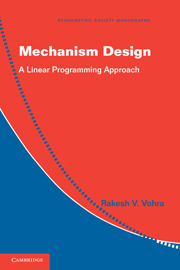6 - Revenue Maximization
Published online by Cambridge University Press: 05 January 2013
Summary
This chapter is concerned with techniques for determining a Bayesian incentive compatible mechanism that maximizes the expected revenue of the designer. On occasion, these mechanisms will actually be dominant strategy incentive compatible. In contrast to much of the literature, we assume that the type space is discrete. We know of no modeling reason to prefer a continuous type space to a discrete one. Rather, the choice should be based on analytical tractability. The discrete type space assumption allows one to formulate the problem of finding a revenue-maximizing Bayesian incentive compatible mechanism as a linear program. It will be seen that the solution for discrete type case is the natural analog of the solution for the continuous case. Indeed, the solution in the continuous type case can be obtained by discretizing the type space and taking the limit. We use this technique to derive a solution for an instance with budget constraints for continuous types – one for which no solution was previously known.
Let Γ be the set of feasible allocations of the resources among the agents and the designer. Let T be a finite set of an agent's types (possibly multidimensional) and N the set of agents. As before, the type of agent k is denoted tk. Let Tn be the set of all profiles of types where n = |N|. A profile in which attention is to be focused on agent k will frequently be written as (tk, t-k).
- Type
- Chapter
- Information
- Mechanism DesignA Linear Programming Approach, pp. 110 - 159Publisher: Cambridge University PressPrint publication year: 2011



